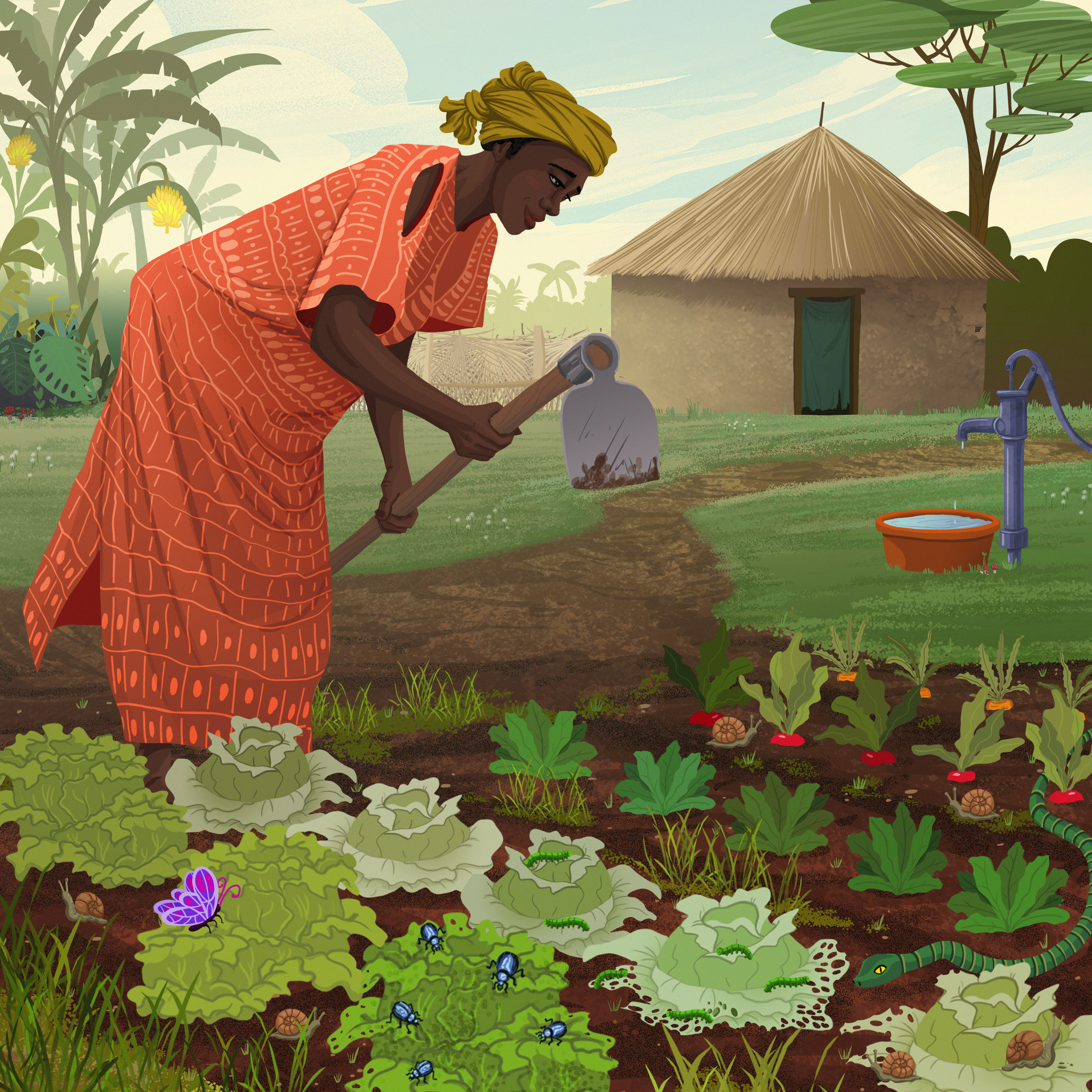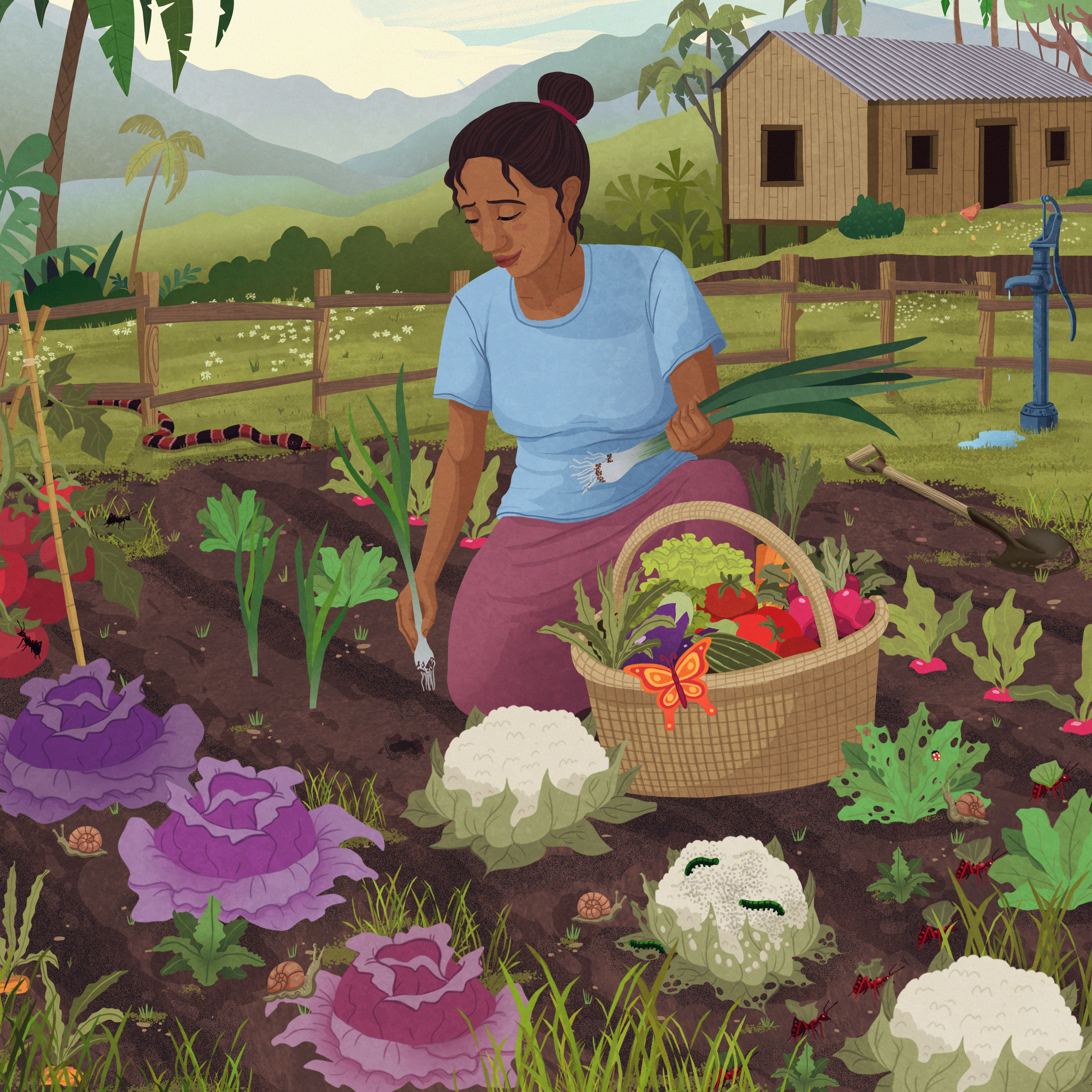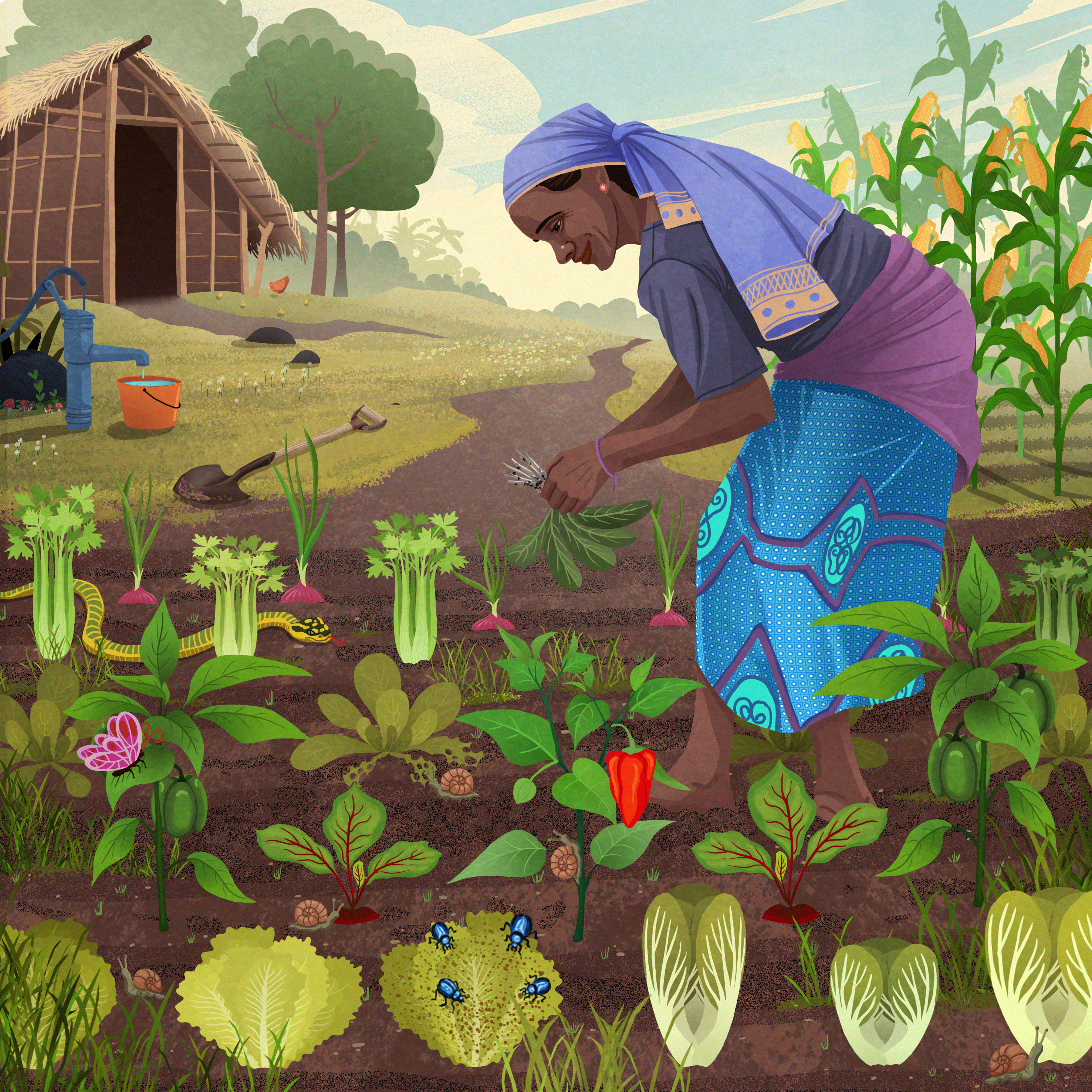Global Child Protection Parenting Curriculum
Year 2, Lesson 1: A Beautiful Garden
Time Needed: 55 minutes
Garden Images:



Teacher Preparation
Objectives
The caregivers will be able to:
- Explore how parenting is like gardening.
- Describe God’s loving provision for human beings through the Genesis creation account.
- Explore the UN Rights of Children and how it relates the ideal world God meant for us.
- Reflect on our heart’s desire for a loving world.
Materials
- Paper and drawing utensil for activity
- Garden image
- Simple crowns made of paper (see example at the end of the lesson)
Preparation
- Read the lesson and reflect on how to teach it wisely.
- Skim previous lesson. Prepare to have a quick review at the beginning of class.
- Consider how many caregivers you have and whether the activity needs to be adjusted for the number of participants in your class.
Introduction
5 minutes
![]()
Welcome caregivers. Make introductions if there are new members in the group. Ask them to share the names and ages of the children they parent.
Welcome to the second year of the parenting course. In the next twelve lessons, you will further explore why it’s important to love, protect, and promote growth for children in your care. Using ancient stories from the Bible, we will notice both wise and unwise approaches to discipline, gender roles, special needs, trauma, internet use and child protection in the larger community. Together we will ask God to guide our minds and hearts as we seek to grow love and respect for our children.
In each lesson, we will use the garden image to compare growing things to children and gardeners to our caretaking role. Let’s begin by looking at the image now.
Show the garden image to the participants. If you have a large class or know that participants will do better discussing in smaller groups, ask them to divide into small groups, listen to each question and respond in groups.
- What is this gardener doing? What makes her a good gardener? Accept answers. Possible answers may include but are not limited to: take care of the plants; observe the plants; learn when to harvest, water, fertilize, prune or protect plants; tend the soil; etc.
- What happens to a garden and its plants when they are left without care? The garden and plants wither, shrink or die.
- What are some ways a caretaker is like a gardener and children are like plants? Accept answers. Possible answers may include: Children need to be observed. Caretakers need to know how to care for children; how to foster growth; be careful with them; protect them and tend to many needs.
A garden cannot grow to be beautiful or fruitful without a good gardener. In the same way, children will not become wise and healthy adults without good caretakers. Children, like plants, need to be treated with care. They need to be observed, understood and protected to grow strong and one day become good parents and caretakers themselves. In this lesson, we will explore the garden God created and how he cared for it to discover his intentions for human growth.
In this lesson we are going to:
- Describe God’s loving provision for human beings through the Genesis creation account.
- Explore the UN Rights of Children and how they relate to the ideal world God meant for us.
- Reflect on our heart’s desire for a loving world.
New Ideas
20 minutes
![]()
Raising children is one of the most challenging jobs possible. We need encouragement and wisdom. Your parents and culture may offer a lot of support, but God has even more wisdom for us. The Bible is filled with stories and examples—from the first book of Genesis to the final book of Revelation—that show us his character and teach us to love him and one another.
Gardens are a repeated image in the Bible. In fact, the story of the Bible begins and ends in a garden. There are many references to growing things such as trees, vines, fruit and seeds that suggest all of creation, including humans, are meant to grow. Growth only happens when there is love. The Bible’s story of creation is different from other ancient myths about the world’s origin because it starts with love instead of violence.
- What are some other creation stories you’ve heard? Accept answers.
Many of these stories involve disorder, competition and various gods wrestling for control. These gods favor the strong, conquering ones. But in the creation story of the Bible, there is no violence. Instead, our God’s story of creation begins and ends with love.
As we read this creation story, pay attention to how we know God cares for his creation.
Genesis 2:26 - 3:2
Read the following scriptures slowly to the caregivers.
26 Then God said, “Let us make human beings so that they are like us. Let them rule over the fish in the seas and the birds in the sky. Let them rule over the livestock and all the wild animals. And let them rule over all the creatures that move along the ground.”
27 So God created human beings in his own likeness. He created them to be like himself. He created them as male and female.
28 God blessed them. He said to them, “Have children so that there will be many of you. Fill the earth and bring it under your control. Rule over the fish in the seas and the birds in the sky. Rule over every living creature that moves along the ground.”
29 Then God said, “I am giving you every plant on the face of the whole earth that produces its own seeds. I am giving you every tree that has fruit with seeds in it. All of them will be given to you for food. 30 I am giving every green plant as food for all the land animals and for all the birds in the sky. I am also giving the plants to all the creatures that move along the ground. I am giving them to every living thing that breathes.” And that’s exactly what happened.
31 God saw everything he had made. And it was very good. There was evening, and there was morning. It was day six.
So the heavens and the earth and everything in them were completed.
2 By the seventh day God had finished the work he had been doing. So on that day he rested from all his work. 3 God blessed the seventh day and made it holy. He blessed it because on that day he rested from all the work he had done.
- What are some of the ways you heard God care for creation? Accept answers.
After God made humans in his image, he blessed them. He gave them the possibility of children; he gave them work and provided abundantly for them. God did not create humans to enslave them or selfishly use them. He didn’t control them or violate their will. He provided for their needs and invited them to grow.
Look at verse 28-30. Listen again to these three verses and see if you can hear how God blesses and provides for humans. Read these again to the participants.
28 God blessed them. He said to them, “Have children so that there will be many of you. Fill the earth and bring it under your control. Rule over the fish in the seas and the birds in the sky. Rule over every living creature that moves along the ground.”
29 Then God said, “I am giving you every plant on the face of the whole earth that produces its own seeds. I am giving you every tree that has fruit with seeds in it. All of them will be given to you for food. 30 I am giving every green plant as food for all the land animals and for all the birds in the sky. I am also giving the plants to all the creatures that move along the ground. I am giving them to every living thing that breathes.” And that’s exactly what happened.
- How does God bless humans? Accept ideas. Possible answers may include: he lets them bring children into the world; he allows them work and to rule; he gives plants, produce, trees to them and everything that breathes.
God loved and blessed humans by giving them everything they needed to grow and increase. He gave them plants, animals, and families. He wanted all his creation to grow and reproduce. This growth could happen because God loved his creation and was present in it. He wanted relationships with his creation. He wanted to provide for their needs, produce food for them and invite them to work alongside him.
- What did God invite humans to do? Accept answers. Possible answers include: have children, fill the earth, rule over the fish and birds and all creatures, receive the food he provided.
Caregiver Connection
5 minutes
![]()
The way God treated the first humans at creation is how he wants to treat us today. He wants to bless, love and protect us. He doesn’t want to manipulate, suppress, or control us. He wants us to be like him and to work alongside him to grow within families that take care of the rest of creation. Children are not meant to be enslaved or selfishly used. Instead, they should be blessed, protected, provided for and invited to grow.
- God asked humans to rule the rest of creation to help it grow. How do you think we can wisely rule our children? Accept answers.
Activity
20 minutes
![]()
Over 100 years ago, 51 countries came together to form the United Nations (UN). Now 193 nations form the members of this group who work to discuss problems in the world and discover solutions that benefit all humans. An important agreement made by the UN was to protect children’s rights so they can grow in health and safety. The UN recognizes each child’s value. They know children are the future of our world and, therefore, must be protected in order to grow as wise adults, parents, community member and leaders. The following activity explores the UN’s list of rights.
- Before I introduce these to you, what rights do you think children have? Allow participants to name the rights they know.
I have a game for us to play that will help us explore and remember some of the UN rights.
- Divide participants into four groups.
- Give each participant paper and a drawing utensil.
- Explain the rules of the game:
- I will read a list of six rights to each group.
- Each group may either memorize the list of rights or draw a symbol or picture on paper to help the group remember. No words are allowed.
- Each group will have one minute to practice recalling all six rights.
- The group who remembers all six wins! You may elect to award winners with a paper crown and announce them king or queen of UN rights. (This is optional; crown instructions can be found at the link at the end of the lesson.)
Group 1: Children have a right to:
- A name
- Privacy
- Safety
- Cleanliness
- Special education if they have a disability
- Choose their own religion and belief
Group 2: Children have a right to:
- Education
- Information
- Protection from harm in mind and body
- Protection from kidnapping
- Care
- Protection from harmful work
Group 3: Children have a right to:
- Health
- Food
- Clothing
- Protection from drugs
- Help when hurt or neglected
- Help when badly treated
Group 4: Children have a right to:
- Contact family if they are away
- Safe living place
- Freedom from abuse
- Play
- An opinion
- Laws that protect them
After the game is over, ask the participants the following questions:
- Are there any rights that surprise you? Accept answers.
- Are there any rights you would add? Accept answers.
- Can you see any of the UN rights present in the creation story? Accept ideas.
God offered humans all these rights in his garden. He created a place of complete safety and provision. God never intended violence, neglect, drugs, kidnapping or death, yet the stories of the Bible are filled with these dangers because humans rejected God’s gifts. Even though each of us has turned away from God, he still wants to bring safety and love to us. We were made for that first garden and the more we connect with God and receive his love, the more we can love and protect these rights for our children.
Reflection
4 minutes
![]()
As a reminder, we will set aside time to be silent in every lesson and listen to what God might bring to our mind and heart about these topics. God made us for relationship with him and each other. We can grow in relationship with him as we take time to listen for his voice. We can receive from God as we listen to him speak to us and spend time getting to learn his ways.
Every human has a deep longing to be back in the garden, to be blessed, seen and cared for. We find it much easier to remember the broken and wounded places in our story, but God wants us to remember our hope for a loving safe world. Children are a blessing, and if we want blessing and safety for our families, we must value and love them as God does. God can lead us to bless, protect and provide for them.
Encourage participants to take a minute to reflect on the following question:
- What would change in your life if you were living in a loving world? Allow a minute for silent reflection.
Closing
1 minute
![]()
In this lesson, we:
- Explored how parenting is like gardening.
- Described God’s loving provision for human beings through the Genesis creation account.
- Explored the UN Rights of Children and how they relate to the ideal world God meant for us.
God is like a gardener who designed every one of us for growth. If we are willing to ask him, he will always make a way to help us grow to love him and others more. He wants to care and provide for us so that we are better equipped to care and provide for our children.
Pay attention in the coming week to the ways you sense God as your caretaker. How does he want to bless and provide for you and your family? We will begin our next class by sharing what you notice.
![]()